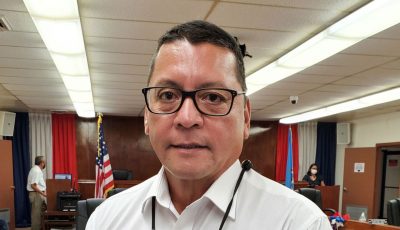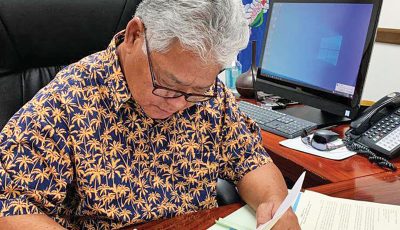SHEFA board seeks more operational budget
The board of the Saipan Higher Education Financial Assistance will seek the assistance of Saipan lawmakers on the possibility of raising the board’s operational budget.
The board’s operational remains unchanged through the years, according to Oscar Babauta, chairman of the SHEFA board.
Babauta said the board plans to “seek an audience” with members of the Saipan and Northern Islands Legislative Delegation to request an amendment to an existing law on the SHEFA board’s operational budget.

Oscar Babauta, chairman of the SHEFA board, says the board will seek a larger funding for SHEFA’s operational needs. (Joel D. Pinaroc)
“The operational budget is about $100,000, which has stayed the same through the years. We have to consider the growth of the island, the need for SHEFA to have its own legal counsel, and other concerns,” Babauta said.
He said the board would not “ask for huge funds” but enough to address its budgetary “constraints.”
Babauta said the board plans to make the request after it meets at the end of this month.
He said the SHEFA board will also work on a report on the status of recipients of grants.
“We are working on coming with historical data. Part of the plan is to constantly communicate with recipients,” he said, adding that there are difficulties, particularly for students who sometimes move from state to state or even from country to country.
In May, House floor leader George Camacho (R-Saipan) and other SNILD lawmakers asked SHEFA to provide data on how many of its beneficiaries have actually reported back to the CNMI after receiving financial assistance.
According to Camacho, the SHEFA has an earmarked budget of “$3.1 million to $3.2 million.”
It was brought up that most of the appropriations should go to awards, rather than the operations of the SHEFA, Camacho said.
“It is hard to check. When you’re done with school, then you look for work. But they [beneficiaries] still need to report and say that they are back and are paying taxes now,” Camacho said.
Beneficiaries of SHEFA are mandated to report on their status. Should the beneficiary decide to work and stay in the United States, they should pay the money back to the SHEFA, Camacho said.
“That is the concern, tracking the students. Either they quit or started work somewhere,” Camacho said, adding that when SHEFA sends out letters, most often the letters are ignored.



























